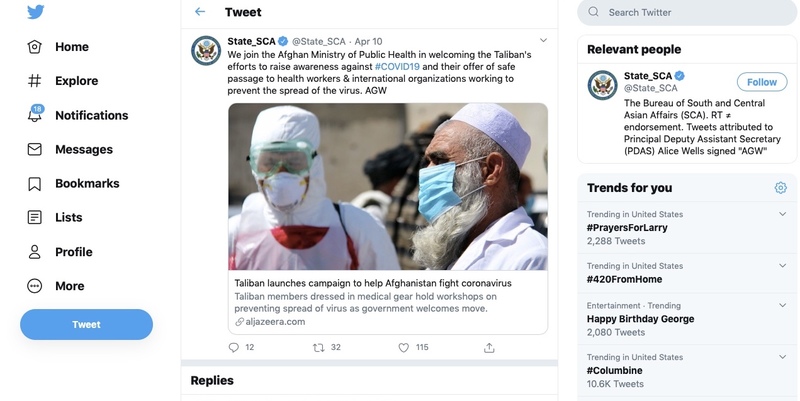Item
Digital Diplomacy: State Department Praises Taliban
Title (Dublin Core)
Digital Diplomacy: State Department Praises Taliban
Description (Dublin Core)
This is a tweet by the United States State Department Bureau of South and Central Asian Affairs, attributed to its Principal Deputy Assistant Secretary, Alice Wells. This tweet is an example of digital diplomacy and practical geopolitics. According to Jason Dittmer and Daniel Bos digital diplomacy refers to diplomatic outreach through social media by policy makers and government officials; practical geopolitics is the discourse associated with politicians and policy makers. The tweet also touches on how the international system is divided into nation-states, yet many fail to govern effectively and there are bad actors that take on responsibilities of the state. Furthermore, in a world of social distancing and limited human interaction digital diplomacy is sure to gain more prominence. During this pandemic, we should all be more acutely aware of how geopolitics is playing out through virtual mediums. There are few interesting elements to this tweet. First of all, the state department rarely ever praises the Taliban for anything. Important context for this praise is the recent peace initiative of the United States for the Taliban and the Afghan government. The recent peace deal brokered by the United States between the Taliban and Afghan Government is incredibly fragile. This context likely informed the State Department’s decision to praise the Taliban. However, the State Department should be prioritizing working with the Afghan government, not the Taliban. Second, this statement of praise for the Taliban acknowledges a great extent of agency and power by the Taliban and the limitations of the Afghan government. The Taliban is a bad non-state actor, but this tweet acknowledges their capacity to provide leadership and services of a state. COVID-19 has created another stage where the Taliban can compete against the Afghan government, and so far the Taliban has responded to this crisis more effectively. Finally, this tweet undermines the popular discourse of COVID-19 versus nation-states. For the most part, responses to COVID-19 are examined on a national level. The prevailing discourse on COVID-19 responses is about the effectiveness of a certain nation-state’s response to the virus. However, this tweet brings up the fact that many governments and nation-states around the world fail in effective governance and that this leaves openings for non-state actors to take on responsibilities of a state. COVID-19 is testing the limits of nation-states’ power and effectiveness and in many places any shortcomings may be corrected by non-state actors (even if they are bad actors). What remains to be seen is if increased constructive interaction between bad non-state actors and the citizens of nation-states leads to an increase in future positive interactions, or if this phenomenon is exclusive to the COVID-19 crisis.
Date (Dublin Core)
Contributor (Dublin Core)
Type (Dublin Core)
Screenshot
Link (Bibliographic Ontology)
Source (Dublin Core)
United States Department of State: The Bureau of South and Central Asian Affairs
Publisher (Dublin Core)
Twitter
Controlled Vocabulary (Dublin Core)
English
Government Federal
English
Politics
Curator's Tags (Omeka Classic)
Date Submitted (Dublin Core)
04/16/2020
Date Modified (Dublin Core)
07/27/2020
10/29/2020
Accrual Method (Dublin Core)
1662

